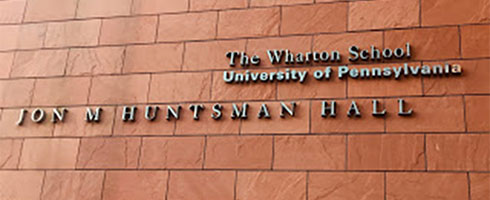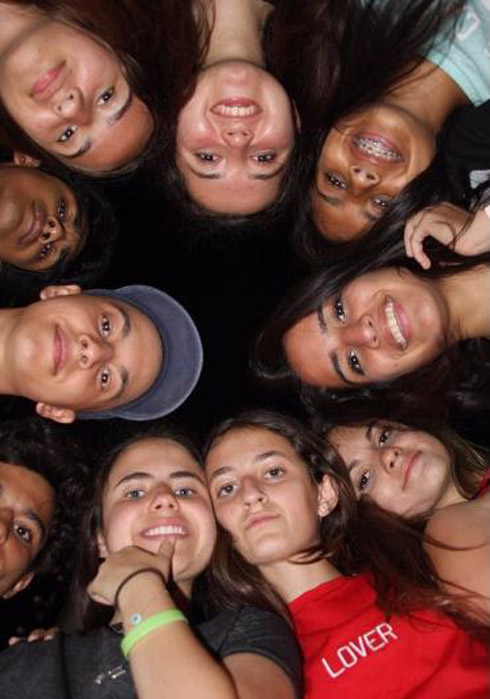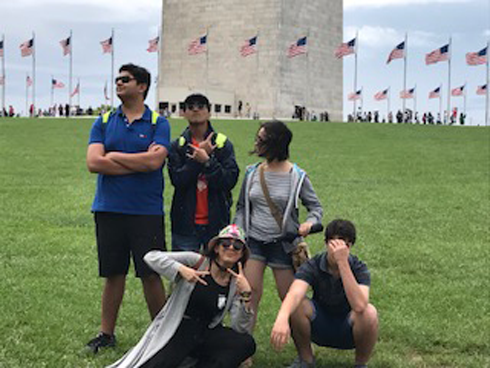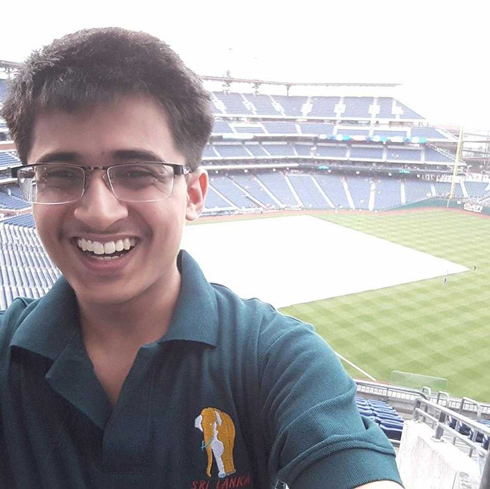
Uday Bansal, a high school senior from Delhi Public School, RK Puram, traveled from his home in New Delhi, India, this summer to participate in the KWHS Global Young Leaders Academy at The Wharton School in Philadelphia. While there, he learned about how entrepreneurs work to identify needs in society in order to develop successful business models. That lesson struck a chord with him and became the inspiration for this article that he wrote about Mumbai’s dabbawalas. Not sure what that is? Read on!
In January 2017, I had the opportunity to participate in the Global Sustainability Summit at Shri Ram College of Commerce, Delhi University (a Mecca/Vatican for business students). The summit brought together students from more than 16 countries with guest speakers ranging from journalists and parliamentarians to social activists and business leaders.
For me, one presenter really stood out. Dr. Pawan Agrawal is an international motivational speaker and a self-made man. Dr. Agrawal’s thesis for his PhD degree is titled A Study of Logistics and Supply Chain Management of Dabbawalas in Mumbai.
For those who don’t know, dabbawalas, dressed in white uniforms, provide a lunch box (dabba) delivery-and-return service in the Indian city of Mumbai that delivers home-cooked food from clients’ homes to their offices, and then returns the empty lunch boxes back to clients’ homes.
Dr. Agrawal can best be described as a dabbawala scholar. During his summit session in January, he detailed the operations of the Mumbai dabbawalas, from the number of trains they have to change in a day, to how they code and decode the lunch boxes. It was fascinating to learn about dabbawalas from someone who has closely studied them from a business perspective and now teaches the world about how they operate. I admittedly have not spent a lot of time in Mumbai, but I became fascinated with this simple, yet highly effective business model that originated in my country. I wanted to share what I’ve learned.
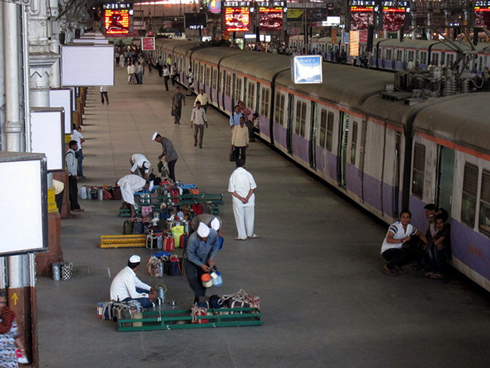
Dabbawalas at CST station, a major railway terminus in Mumbai (photo by travelwayoflife, used under CC license)
From 100 to 5,000
Mumbai’s dabbawalas have been operating for more than 125 years. They have perfected their business brand through hard work and commitment. They are ubiquitous. Many people couldn’t imagine the streets of Mumbai without them.
As the story goes, about 125 years ago, a Parsi banker wanted to enjoy home-cooked food in his office and gave this responsibility to the first-ever dabbawala (delivery guy). Many people liked the idea, and the demand for dabba delivery soared. It was all informal and individual effort in the beginning, but visionary Mahadeo Havaji Bachche saw the opportunity and started the lunch delivery service in its current team-delivery format with only 100 dabbawalas. As the city grew, the demand for dabba delivery also grew. Now an army of 5,000 dabbawalas in their signature Gandhi caps serve a clientele of some 200,000 Mumbaikars.
You may be wondering why people can’t carry their own lunch boxes from home. Is India still full of spoiled Maharajas (Indian kings and princes)?
Nope, that’s not the case. During my participation in the Global Young Leaders Academy at Wharton, I learned about the significance of identifying a need, a demand in society that successful entrepreneurs seek to satisfy through their products and services. Dabbawalas meet a great need in Mumbai, and their approach, however simple, is brilliant on many levels. Here’s why:
1. Mumbai local trains, the lifeline of the city, are over-crowded, which makes it difficult for anyone to carry even a lunchbox. Trust me folks, this is not an exaggeration. You can’t board the trains without a struggle when your hands are empty, so carrying a bulky lunchbox while vying for train space is out of the question.
2. Dr. Agrawal explains the second reason as follows: “For a man to reach his office at 9:00 a.m., he has to leave at 6:00 a.m. (because of the long train routes), which means that his wife or mother would have to cook the boxed meal at 5:00 a.m. To avoid this inconvenience, the dabbawalas collect the tiffin [an Indian word for lunch box] at say 9:00 a.m. from the house, deliver it to the office before the lunch hours and then collect the empty lunch boxes to deliver back home.”
3. The third reason this model is especially effective in Mumbai is that home-cooked food is preferred by the masses because of health, emotional and financial reasons. Eating food from restaurants is expensive and street food, though delicious, isn’t considered especially healthy for regular consumption. Also, in my culture home-cooked food is the ultimate way for a wife or mother to express her love and affection for her husband or son. Dabbawalas tap into all these needs and have created an industry that — even after 125 years — has a growth rate of as much as 10% per year.
A Day in the Life of a Dabbawala
You can’t explore the dynamics of this unique business model without considering the logistics. It’s a simple and streamlined distribution system.
The first dabbawala picks up the tiffin from home and takes it to the nearest railway station.
The second dabbawala sorts out the dabbas at the railway station according to destination and puts them in the luggage carriage.
The third one travels with the dabbas to the railway stations nearest to the destinations.
The fourth one picks up dabbas from the railway station and drops them off at the offices.
The dabbawalas rely on low costs to get the job done, using cycles, wooden carriages and local trains and very little technology to meet their daily goals.
Several groups work independently and network with each other to cover service areas.
Of Tiffins and Takeaways
I felt compelled to write about these workers because I was amazed by their level of success and commitment. So many lessons for anyone who wants to make his way in the business world! Here are my top nine:
Passion and Practice. Some 35% of dabbawalas are illiterate, and the average education level of their workforce is 8th grade. Even so, they have created a sound and reliable delivery model that could easily go awry for even the most highly educated worker. Initially, they developed a color-coding system for the lunchboxes, but as the city and the demand for their services grew, this developed into an alpha-numeric system. Many dabbawalas can’t read the alphabet, but can recognize and differentiate the letters and numbers on the basis of their distinct shapes. On average, each dabbawala carries a weight of 130 to 150 pounds. The workforce includes dabbawalas as old as 75 years who take pride in their ability to support themselves with their hard work. “No excuses” is their motto.
Dedication. It took more than 100 years for dabbawalas to get the recognition they deserved. In our success-hungry world where people think of perks before performance, we should learn to uphold the dabbawalas’ high level of service and job performance.
Execution and accuracy. In 1998, Forbes Magazine conducted a quality-assurance study and awarded the Mumbai dabbawalas a Six Sigma efficiency rating of 99.999999! That means they have an error rate of 1 in every 16 million transactions. Mumbai dabbawalas are the second organization in the world and the first in India to earn this distinction. In the words of Dr. Agrawal, for dabbawalas “error is horror.”
Commitment to quality service. Dabbawalas depend on the local train system where they travel in the luggage compartments, but the trains are hardly ever on time. Does that mean the dabbawalas also face delays in their delivery? Never! They have made a commitment to timely delivery, and they make sure they keep their word. Dabbawalas believe that if they miss lunch hours, then clients will go without food. Dr. Agrawal explained that at times housewives pack their husbands’ medicines along with the lunchbox. If the delivery is not on time and something happens, the dabbawalas would feel responsible.
Time management. Dabbawalas believe that since they can’t control the train schedules, they have to follow strict discipline to make timely deliveries. A dabbawala works for eight to nine hours a day, which includes a three-hour period of so-called “war time” in the morning. This is because they have to adhere to the lunch timings of the offices of their clients and make timely deliveries no matter what happens. During their hectic nine-hour workday, dabbawalas only get 20 minutes to eat their lunches while their clients finish their meals.
Strong, experienced leadership. Each area is divided into several small distribution sectors, and each sector is handled by a person known as a mukadam (group leader). The elder-most member of the group gets the job of the mukadam, which comes with no extra pay, but the management of 12 to 14 other dabbawalas and an opportunity to lead the men in white. Many new employees work for months under the guidance of their seniors.
It’s all about work and customer. Dabbawalas charge around $10 per month per customer. They will only charge customers for the months of service, and not if they take a month-long vacation. Since their inception in 1890, the dabbawalas have never had a police case or legal dispute in court. They didn’t go on a workers’ strike until as recently as 2011, and that was for one day to support a movement against corruption and not to make personal demands, which is the case with most labor union strikes. Apart from their salary, dabbawalas expect one month’s salary as an extra ‘Diwali bonus,’ but they will neither complain nor quit their services if their customers deny them the bonus. When Prince Charles visited India in 2003, he wanted to meet the legendary dabbawalas. The dabbawalas agreed, but only if he would meet them between 11:20 a.m and 11:40 a.m. in front of the railway station when they were eating lunch and temporarily free from their duties.
Trust. On payday many clients keep their salaries in their lunch boxes, which are safely delivered home by the dabbawalas, in order to avoid the risk of pickpocketing on local trains. Dabbawalas add value in other ways. In one story I read, a dabbawala recounts this tale of a feuding couple: “The husband left in a rage for the office. I collected the lunchbox from his wife as usual and delivered it to the husband. When the husband opened the box, he found a letter which read, ‘I am sorry. Don’t be angry and please eat your food. I love you.’ Now the husband had turned from one angry young man to one hungry young man. He finished his food and kept two movie tickets in the lunchbox along with a letter that read, ‘I am sorry and I love you too.’ That’s why I believe that we dabbawalas don’t carry just food. At times we also carry love.” Dabbawalas have built brand loyalty and trust in Mumbai society.
Corporate social responsibility. ‘Share My Dabba’ is a dabbawala initiative that gives leftover lunch food to the underprivileged. Clients with little red share stickers on their lunchboxes participate in this community program. Roti Bank is another dabbawala initiative to address food waste at big events like marriages and at restaurants. Dabbawalas collect excess food and make sure it reaches the needy.
I’m excited to have explored the Mumbai dabbawala business model so deeply. Their work ethic and operational efficiency provide timeless lessons for success in business and entrepreneurship. Sometimes the greatest messages of strength, character, quality and perseverance come from the most unlikely places. The men in white are in many ways role models for the next generation of workers.
This article was originally published by Knowledge@Wharton High School. Reproduced here with permission.
For more wisdom from high-school students, click on the links below!
What does it take to be a topper? Q&A with Shivang Singh
ISC topper from Mumbai shares the secret of his success and some advice
Learning to embrace the impractical and think more creatively
Why I worry about President Trump’s exit from the Paris Agreement
Advice from a girl who worked hard and got to choose between an Ivy League offer and a full scholarship
A taste of what it’s like to study at The Wharton School
How Trump’s election has affected my application decision
